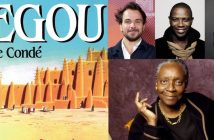Guelwaar, your last feature, was shown practically all over France: were you able to present it in Africa?
I’m showing it in Senegal and in all of Francophone Africa. It’s being shown exclusively and in cinemas on the outskirts where the tax department inspects less frequently, which causes problems. As for France
Europe is not my centre and I’m less concerned about the success of my films there. But it was shown in festivals and on television in Germany, England, Belgium, etc.
What did you want to tackle in this film?
This film raises questions for the coming generations. It tries to demystify what is commonly called humanitarian aid. How many NGOs are there in Africa? What do they live on? After forty years of independence, Africa still hasn’t developed. Zaire, Congo, Liberia: it’s the jungle
Apparently, you are working on a plan on the African woman
Without women, there are no men and vice versa, but there is a society in which women have played a big role. For a time, women were minimized by Catholicism and Islamism but things are starting to change. In Africa, it is not women who need to be liberated but women who need to liberate men. I’m working on that subject.
What topics would you like to tackle that you haven’t had the chance to?
I’m not dead yet! Up until now, I’ve tackled every topic I wanted to. In this present period of accelerated changes, all topics are important. Everyday, in each city, there is something new. Each street corner, each front door is a topic for an artist!
What do you think of the city/country debate at the centre of the discussions on black Africa cinema?
I don’t ask myself those questions. You have the right to ask yourselves your questions in France and I have the right to ask myself mine in Africa!
In your film, asserting an independence and a unity for Africa is a constant priority.
Yes. There are six million inhabitants in Senegal; Mali and Burkina are small, have no economy and no means for living. There lies the problem.
You show impressive optimism for the future.
That’s what Man is made of! Otherwise, it would be despairing of him. He is capable of the worst and of the best. I try to encourage the good things. A minority of Africans living in the West conform to the greyness and lose hope, thinking that the machine precedes man. I like what philosopher Alain said: « Pessimism is an outburst of temper; optimism stems from will ».
You are against globalization.
Ethics-wise, Europe has no lesson to teach Africa! During three centuries of slavery, Africans didn’t disappear; they passed on religion, ethic and creation. They had faith in life. The capital of globalization is America, which isn’t a model for civilization! You know the misery there. And Latin America is only an American colony
Under the pressure of the media, Africans who have only a ball of manioc in their hand start talking about globalization!
You are one of the only filmmakers to have explored memory.
Not enough! I live on top of a gold mine of creativity! There is not just one culture for Senegal, one for Mali or one for the Ivory Coast: there are only different facets to a mosaic of richness. Look at the colours and the drawings on the blacksmiths’ and the potters’ cloths
Does rap come from America or does it draw its sources from the traditional African declamations? Nothing is invented: it is just emphasized or singled out.
Emitaï and Ceddo are based on a popular memory and an orality.
I need to get closer to my public, who understands these references. African cinema must teach; it must be a night school, which is something that Western cinema can afford to do without. I’m interested in finding the language that will allow me to address the farmer from Limpopo when I’m on the bank of the river Senegal.
Are you looking for the similarities between all the African cultures?
There are similarities! I have to find what appeals to our time. In Sudan, for example: people from the South must see Ceddo! They are not anti-religious but religion must not be imposed on them!
This reference to orality allows you to reverse the nationalist discourses
I don’t like nationalism: it’s too restricted and it’s dangerous!
Will you want to commemorate the 150th anniversary of the abolition of slavery?
Who’s going to commerate it? From which point of view? What on earth will Europe be able to commemorate? The end of horror? Kings restored it, the Republic went on with it
Priest Grégoire? He was a candidate at Saint Louis but wasn’t elected. It’s up to the Africans to analyze this period of slavery. Even that is being taken away from them! To what extent were Africans involved in this? And the Arab world? Slavery is still alive: children are being sold illegally! I would like Africans to be brave and analyze this issue, but without letting the West intervene: let it be a witness only.
Like the priest in Ceddo who is never allowed to speak
His presence is enough! With his get-up, we know he is there. Why should we let him speak? To say what?
Jack Lang said that the West should ask for forgiveness
The Pope went to Corea to ask for forgiveness: it’s already been done! Why do Westerners keep on asking for forgiveness? In whose name? I tell Africans: you can forgive but you cannot forget. Asking for forgiveness is part of the Western culture of absolution. I don’t believe them! Africans were accomplices on every level of this chain of slavery but when you say that, they get mad!
Today, don’t you think that these issues are ripe and ready to be tackled?
The man is always ripe if he knows how to think. That would imply that we weren’t ripe yesterday. So will we be rotten the day after tomorrow?
You often said that cinema was a better way to appeal to the masses than books. Do you still think that’s true, despite the film exploitation difficulties?
Yes. Books are limited by the purchasing power. I go to junior high schools, high schools and cinemas where I meet people and I noticed that images appeal to them in a direct way, which isn’t the case with books. That’s also true abroad.
Through the detail and the music, your films play a lot on paradox and provocation.
I don’t like the word ‘provocation’. I’m not taking the word away from you but I don’t provoke! I have to find a writing, an expression of sound that will push people to talk and to think. I try to see things from their point of view. I can’t tell them what to see but I can offer a reflection. Even if they don’t like it, the important thing is that it triggers a reflection. I’m not asking for an emotional adherence but participation.
Is that the function of culture for you?
Yes.
What would you say to young generations today?
That those in Europe should learn: technically-speaking, there is a lot to learn. We must build a dynamic and independent Africa, where everyone is allowed to express themselves.
Do people still understand what you said about cinema being a night school for Africans?
My cinema. I’m not asking African cinema to be a reflection of my own cinema. There are lots of comedies that I also like. I would like for everyone to have the right to express themselves as they wish. As Mao said: « Let all the flowers bloom in the garden! » As for me, I’m trying to find the way for my next film to move the biggest number of people.
Do you first work on the book or on the film ?
I work on both and that is what’s difficult. One influences the other. For exemple, I’ve been working on a small scene for a week. Literary-wise, it’s a success but film-wise, I’m still working on it because it’s difficult: I need to find a few seconds. It’s not about emotion anymore: it’s about a mathematical frame to manage to express things. All the while keeping in mind that I’m adressing Senegalese as well as Limpopo farmers!
What is the most difficult: writing or filming?
Filming is very difficult: apart from the work on the screenplay, you have to rush around trying to find the money, the actors, the costumes and rehearse. For writing, everything is in my head: I have the setting I want, the actors, the expression and the terms I want.
What is your favorite film?
My next film!








